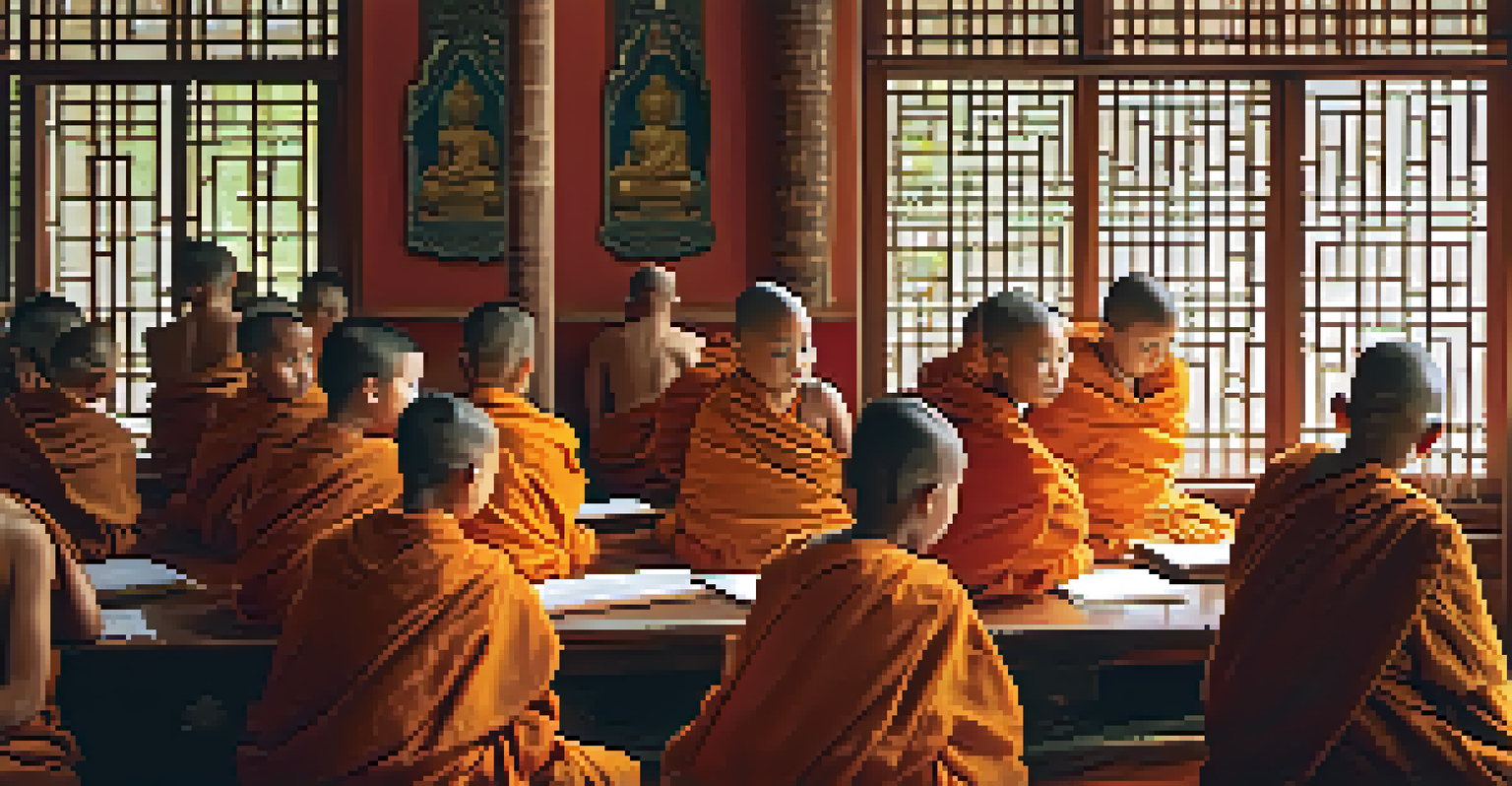The Role of Monks in Modern Thai Society and Culture

Monks as Spiritual Leaders in Thai Communities
In Thailand, monks play a pivotal role as spiritual leaders, guiding the community in Buddhist teachings and practices. They serve as a moral compass, helping individuals navigate life's challenges through the lens of compassion and mindfulness. This leadership is not confined to temples; monks often engage in community events, promoting values that resonate with Thai culture.
The mind is everything. What you think you become.
The presence of monks in everyday life can be seen during important ceremonies, such as weddings and funerals, where their blessings are sought. These rituals highlight the significance of spirituality in Thai culture and illustrate how monks serve as a bridge connecting the community to its religious roots. Their involvement fosters a sense of belonging and continuity among the people.
Additionally, monks often provide counseling and support to those in need, highlighting their role as caregivers. Through their teachings, they inspire individuals to cultivate positive qualities such as generosity and kindness, which are deeply embedded in Thai society. This spiritual guidance not only uplifts individuals but also strengthens the fabric of the community.
Monastic Life and Its Impact on Society
Monastic life in Thailand is characterized by strict adherence to the Vinaya, the monastic code of conduct, which shapes the daily routines of monks. This lifestyle emphasizes simplicity, meditation, and community service, serving as a model for laypeople. By living out these principles, monks inspire societal change and encourage others to lead more mindful lives.

The discipline practiced by monks is evident in their early morning alms rounds, where they receive food offerings from community members. This ritual not only sustains the monks but also reinforces the values of generosity and gratitude among the laypeople. It's a beautiful exchange that strengthens the bond between monks and the community.
Monks as Community Spiritual Leaders
Monks guide Thai communities in Buddhist teachings, offering moral support and fostering a sense of belonging.
Moreover, monks often engage in initiatives that address social issues, such as education and environmental conservation. By advocating for these causes, they demonstrate that spiritual practice extends beyond the temple walls and into the daily lives of the people. Their role as active participants in societal development showcases the relevance of monastic life in modern Thailand.
Monks and Education: A Pillar of Learning
Education is a crucial aspect of a monk's life, as many monasteries in Thailand function as schools for young boys. This educational framework offers not only religious instruction but also lessons in ethics, discipline, and respect. For many children, becoming a novice monk provides an opportunity for learning and personal growth that can shape their future.
In a gentle way, you can shake the world.
Monks often teach subjects like mathematics, language, and science, blending traditional Buddhist teachings with modern education. This dual approach helps students develop a well-rounded understanding of the world, fostering critical thinking and moral reasoning. Such educational initiatives are vital, especially in rural areas where access to formal schooling may be limited.
Furthermore, by emphasizing the importance of education, monks encourage families to prioritize learning for their children. This cultural shift highlights the belief that spiritual and academic development go hand in hand. As a result, many Thai communities have come to view monks not just as religious figures but also as educators and mentors.
Cultural Preservation through Monastic Practices
Monks play a significant role in preserving Thai culture and heritage through their various rituals and traditions. Many festivals and celebrations are rooted in Buddhist practices, showcasing the rich tapestry of Thai history and spirituality. By actively participating in these events, monks help keep the cultural narrative alive for future generations.
For instance, ceremonies like Songkran (Thai New Year) and Loy Krathong are deeply intertwined with Buddhist beliefs, emphasizing the importance of water, renewal, and gratitude. Monks lead these celebrations, guiding the community in their spiritual significance. Their involvement not only enriches the festivities but also ensures that cultural practices are passed down through generations.
Education through Monastic Life
Many monasteries serve as schools, where monks educate young boys in both religious and academic subjects.
Additionally, monks often engage in art forms such as traditional Thai dance and music, which are essential components of cultural identity. By embracing these artistic expressions, they contribute to a vibrant cultural landscape that honors the past while adapting to the present. This dynamic relationship between monks and culture highlights their vital role in maintaining Thailand's unique heritage.
Monks and Community Service: A Lifeline for Many
Community service is another area where monks make a significant impact in modern Thai society. Many monks are actively involved in charitable activities, providing assistance to the less fortunate and promoting social welfare. Their commitment to helping others reinforces the Buddhist principle of compassion and underscores the importance of community solidarity.
Through initiatives like food distribution, health care services, and disaster relief efforts, monks address pressing social issues and offer support to those in need. Their presence during times of crisis brings comfort and hope, reminding people that they are not alone in their struggles. This role as caregivers and advocates enhances the monks' connection to the community.
Moreover, monks often encourage laypeople to participate in these acts of service, fostering a culture of giving and empathy. By leading by example, they inspire others to contribute positively to society. This collaborative spirit not only strengthens community ties but also reinforces the idea that everyone has a role to play in building a better world.
Monks and the Global Perspective: A Modern Influence
As globalization continues to shape our world, monks in Thailand are also adapting to new challenges and opportunities. Many are using technology and social media to share Buddhist teachings and connect with a broader audience. This modern approach allows them to reach individuals beyond the confines of traditional temple walls.
By embracing digital platforms, monks can engage with people from various backgrounds, offering insights into mindfulness, meditation, and ethical living. This outreach helps demystify Buddhism and makes its teachings more accessible to those who may not have prior exposure. As a result, monks are becoming influential voices in the global conversation on spirituality and well-being.
Community Service and Compassion
Monks actively engage in charitable activities, promoting social welfare and inspiring community solidarity.
Furthermore, the international interest in mindfulness and meditation has led to an increased appreciation for Thai monks and their teachings. Many people travel to Thailand seeking authentic experiences and spiritual guidance, further highlighting the monks' role as ambassadors of Thai culture. This global perspective enriches the cultural exchange and showcases the relevance of monastic practices in contemporary society.
Challenges Facing Monks in Contemporary Thailand
Despite their vital role, monks in Thailand face several challenges in the modern context. One significant issue is the declining number of young men entering monastic life, as societal expectations evolve and career opportunities expand. This trend raises concerns about the future of monastic communities and the preservation of traditions.
Additionally, the increasing influence of materialism and consumer culture poses a challenge to the spiritual values that monks embody. Many young people are drawn to the allure of modern lifestyles, often neglecting the teachings of Buddhism that emphasize simplicity and detachment from worldly possessions. This shift can create a disconnect between the younger generation and the monastic community.

Moreover, monks must navigate the complexities of contemporary social issues, such as economic inequality and environmental degradation. Addressing these challenges requires adaptability and a willingness to engage with the broader societal landscape. As monks continue to play a crucial role in Thai society, finding ways to remain relevant while staying true to their spiritual roots will be essential.
The Future of Monks in Thai Society
Looking ahead, the role of monks in Thai society remains as crucial as ever. As spiritual leaders, educators, and community advocates, they have the potential to shape the future of Thailand by promoting values of compassion, mindfulness, and social responsibility. Their teachings can guide individuals and communities toward a more harmonious and fulfilling existence.
To adapt to the changing landscape, monks may need to embrace new methods of outreach and engagement, leveraging technology and social media to connect with younger generations. By doing so, they can ensure that Buddhist teachings remain relevant and accessible, fostering a deeper understanding of spirituality in modern life.
Ultimately, the future of monks in Thai society will depend on their ability to balance tradition with innovation. By embracing change while honoring their roots, monks can continue to inspire and uplift communities, ensuring that the essence of Buddhism remains a guiding light in the lives of many.